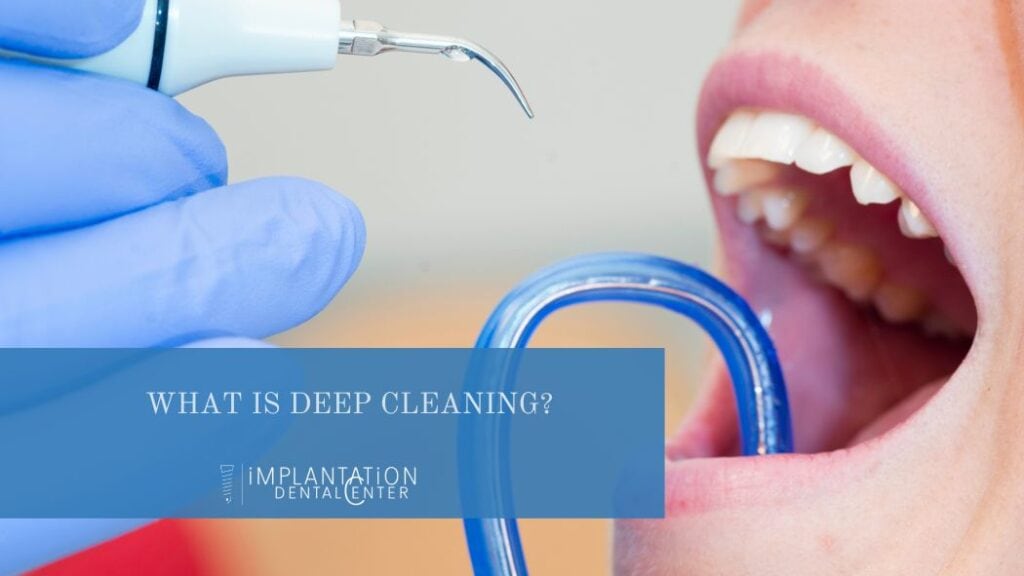In dentistry, a deep cleaning is also known as scaling and root planing. It is a non-surgical procedure that is performed by a dental hygienist or dentist to remove plaque, tartar, and bacteria from below the gumline and smooth out rough spots on the roots of teeth.
A deep cleaning is typically recommended for patients with gum disease, also known as periodontitis. Gum disease is a bacterial infection that can cause inflammation and damage to the gums, bones, and tissues that support the teeth. If left untreated, it can lead to tooth loss and other serious health problems.
During a deep cleaning, the dentist or dental hygienist will use special instruments to remove plaque and tartar from the teeth and roots, and smooth out any rough spots that may be present. The process may also involve irrigation to flush out bacteria and debris from the pockets between the teeth and gums.
Overall, a deep cleaning in dentistry is an important procedure for maintaining good oral health and preventing or treating gum disease. It is usually recommended as part of a comprehensive treatment plan that includes regular dental exams, cleanings, and good oral hygiene practices at home.
Can my teeth get loose after a deep cleaning?
It is not common for teeth to become loose after a deep cleaning, but it can happen in some cases. The most likely explanation for teeth becoming loose after a deep cleaning is that the cleaning process has uncovered an underlying dental issue that was not previously detected.
If you have advanced gum disease, for example, the cleaning process may have removed bacteria and debris that were helping to support your teeth, causing them to become loose. Additionally, if you have other underlying dental problems, such as periodontal abscesses or gum recession, these issues may become more apparent after a deep cleaning.
It is also possible that the deep cleaning process itself may have caused temporary sensitivity or inflammation in the gums, which can make the teeth feel loose. However, this is usually a temporary side effect that should improve within a few days.
If you are experiencing loose teeth after a deep cleaning, it is important to schedule a follow-up appointment with your dentist as soon as possible. Dr. Hervas prefers to see his patients back immediately, to examine the teeth and gums to determine the underlying cause of the problem and recommend appropriate treatment to help stabilize your teeth and prevent further damage.
How often do I need a deep cleaning?
The frequency of deep cleanings or scaling and root planing treatments depends on the individual patient’s oral health condition. In general, patients with healthy teeth and gums may not need deep cleanings very often, while those with gum disease or a history of dental problems may need them more frequently.
The American Dental Association recommends that patients receive a comprehensive dental exam and regular cleaning every six months to maintain good oral health. During these regular checkups, your dentist or dental hygienist can evaluate your oral health and determine whether a deep cleaning or other treatment may be necessary.
If you have gum disease or other dental issues, your dentist may recommend more frequent deep cleanings or scaling and root planing treatments to help manage the condition and prevent further damage to your teeth and gums. The exact frequency of deep cleanings will depend on the severity of your gum disease and other individual factors, such as your age, overall health, and lifestyle habits.
It’s important to follow your dentist’s recommendations for regular checkups and cleanings to maintain good oral health and prevent dental problems from developing or worsening. If you have any concerns about the frequency of deep cleanings or other dental treatments, be sure to discuss them with your dentist.
Why do I produce so much tartar or calculus?
Tartar, also known as calculus, is a hard, yellow or brown substance that forms on the teeth and can lead to dental problems like cavities, gum disease, and bad breath. There are several reasons why some people produce more tartar than others, including:
- Poor oral hygiene: If you do not brush and floss your teeth regularly, plaque (a sticky film of bacteria that forms on the teeth) can build up and harden into tartar.
- Genetics: Some people may be genetically predisposed to producing more tartar than others. If you have a family history of dental problems, you may be more likely to produce tartar.
- Diet: Consuming foods and drinks that are high in sugar or carbohydrates can increase the production of plaque and tartar on the teeth.
- Smoking: Tobacco use can contribute to the buildup of tartar on the teeth and increase the risk of gum disease.
- Age: As we get older, the production of saliva (which helps to neutralize acid in the mouth) can decrease, leading to an increased risk of tartar buildup.
If you are producing a lot of tartar or calculus, it is important to see a dentist or dental hygienist regularly for cleanings and exams. They can remove the tartar buildup and recommend ways to improve your oral hygiene and prevent further buildup. Additionally, practicing good oral hygiene habits at home, such as brushing twice a day, flossing daily, and using an antiseptic mouthwash, can help to reduce the buildup of plaque and tartar on the teeth.
Implantation Dental Center is located just outside of Fort Lauderdale, in Plantation, Florida. If you’re experiencing concerns about your gum health, or the integrity of your teeth, we encourage you to give our periodontist a call. Our team specializes in full mouth restoration, and can help address all the underlying issues with your smile.



